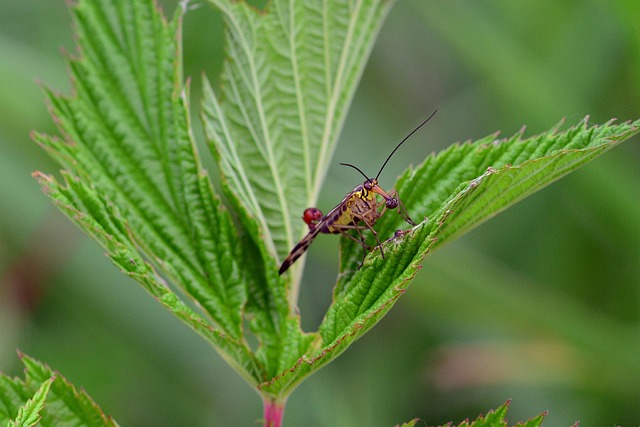Scorpions, though elusive, prefer dark, secluded habitats and become active at sunset in warm, dry environments. Eco-friendly scorpion solutions involve regular inspections, clutter removal, sealing gaps, and using natural repellents like essential oils (e.g., lemon eucalyptus, peppermint, lavender) and beneficial insects. Maintaining a decluttered space, sealing entry points with weatherstripping and caulk, and outdoor cleaning further discourages scorpions. Regular monitoring, quick response, and combining these methods significantly reduce the likelihood of an infestation while avoiding traditional toxic chemicals.
Keep your properties scorpion-free with effective maintenance programs. Understanding these pests’ behavior and habitat preferences is key, allowing for targeted prevention measures. Implement eco-friendly solutions like regular cleanups, sealing entry points, and choosing plant species that deter scorpions. Regular maintenance tasks, such as vacuuming and sweeping, are essential. Stay vigilant through monitoring and swift response to ensure a scorpion-free environment. Discover these strategies for successful, eco-conscious scorpion management.
Understanding Scorpion Behavior and Their Habitat Preferences
Scorpions are elusive creatures that prefer secluded, dark habitats, often hiding in cracks, crevices, and under debris. Understanding their behavior is key to developing effective maintenance programs. These arachnids are primarily nocturnal, seeking shelter during the day and becoming active as the sun sets, making them less visible but no less dangerous. They are attracted to warm, dry environments with easy access to water sources, which can include properties with poor drainage or exposed plumbing.
Eco-friendly scorpion solutions involve creating an environment that discourages their presence without harming other wildlife or using harsh chemicals. Regular inspections should be conducted to identify potential hiding spots and entry points. Maintaining a well-trimmed lawn, removing clutter, and sealing gaps in walls and foundations can significantly reduce Scorpion habitats. Additionally, using natural repellents like certain plants and essential oils known for their scent deterring these pests can be integrated into a comprehensive maintenance strategy.
Implementing Eco-Friendly Scorpion Prevention Measures
Implementing eco-friendly scorpion prevention measures can be an effective and sustainable approach to keeping properties free from these pests. Traditional methods often rely on toxic chemicals, which can have detrimental effects on the environment and potentially pose risks to human health. Instead, homeowners and property managers can opt for natural, non-toxic solutions that are just as efficient in deterring scorpions. One such method is using essential oils known for their repellent properties; these include lemon eucalyptus, peppermint, and lavender oil. Spraying a mixture of water and these oils around entry points, windows, and doors can create an odor barrier that discourages scorpions from entering.
Another eco-friendly strategy involves harnessing the power of beneficial insects. Certain species of spiders and insect predators feed on scorpions, so introducing these natural predators into the ecosystem can help control scorpion populations. Additionally, sealing off potential hiding spots like cracks, crevices, and gaps in walls or floors can prevent scorpions from finding shelter. Using sustainable materials for sealing and repairing these entry points ensures that the process is environmentally friendly while maintaining a scorpion-free environment.
Regular Maintenance Tasks for Scorpion Control
Regular maintenance is key to keeping scorpions at bay, and there are several eco-friendly scorpion solutions that homeowners can implement. One of the most effective strategies is to maintain a clean and clutter-free environment. Scorpions thrive in dark, hidden spaces, so regularly decluttering areas like garages, attics, and sheds will reduce potential hiding spots. Additionally, ensuring proper sealing of entry points such as doors, windows, and vents is vital. Use weatherstripping and caulk to fill gaps where scorpions might enter.
Another important task is regular outdoor cleaning, especially in areas with high scorpion activity. Remove any debris, organic matter, or piles of wood or leaves that could provide shelter. Keep grass cut short and consider installing lights around the property, as scorpions are often attracted to darkness. By combining these eco-friendly scorpion solutions with consistent maintenance, homeowners can significantly decrease the risk of a scorpion infestation.
Monitoring and Quick Response: Key to Effective Scorpion Management
Monitoring and quick response are critical components of any successful ongoing maintenance program aimed at keeping properties scorpion-free. Regular, thorough inspections help identify potential entry points, nest locations, and signs of activity early on. This proactive approach allows for the implementation of eco-friendly scorpion solutions before the problem escalates.
By maintaining a vigilant eye on these aspects, property managers or homeowners can quickly address any issues. For instance, sealing cracks and gaps around windows, doors, and utility pipes can prevent scorpions from entering. Additionally, using natural repellents like diatomaceous earth or essential oils in strategic locations can deter scorpions without harming the environment or humans. Quick response to scorpion sightings also ensures that any infested areas are treated effectively with minimal disruption to daily activities.
Maintaining a scorpion-free property requires a multi-faceted approach. By understanding these creatures’ behavior, habitat preferences, and implementing eco-friendly prevention measures, homeowners can significantly reduce their presence. Regular maintenance tasks, such as sealing entry points and keeping areas clean, are crucial. Additionally, monitoring and promptly addressing any signs of scorpions are key to effective management. Adopting these strategies ensures a safer, more comfortable living environment while promoting sustainable practices, providing the best of both worlds for both homeowners and nature.
